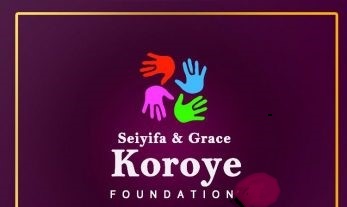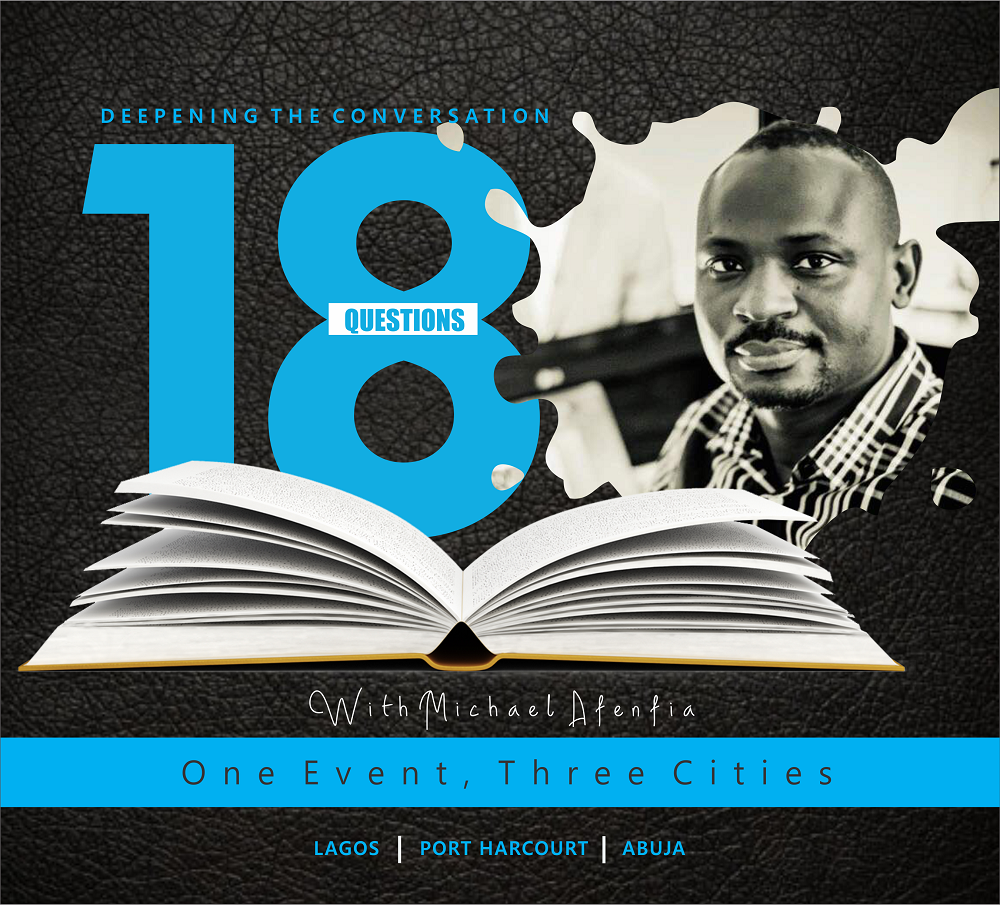MARCH 10 2018.
10:00 AM
YENAGOA.
We meet at Davem – me, Arabina, Romeo, and Rex. The weather is tepid today. The sun smiles above us, a bundle of happy clouds gathers loosely around it, a bright Saturday morning. While we wait for Mrs Nikade we share handshakes, jumping into a discussion without knowing what our names are, silly ways of boys. Romeo talks about an event he had covered a week back; Arabina backs him up, gushing about the fine girls of Yenagoa in attendance. Romeo brushes him aside with a slight nudge of his slim ankle. His facial hair looks attractive, scary and artistic at the same time. He is a photographer and so is not freaky about fine girls – not anymore. He must have seen a lot of them and shot them with his creative lens.
Rex doesn’t talk much. He pays more attention to his phone, reading and replying to texts. Looking at him reminds me of Kwaku Lynn. The dark shiny skin, the tall broad frame covered in colourfully designed Ankara prints makes him look somehow like the stylish Negro. Mr. Afenfia drives in now. He’s wearing a black on black native. A young man is with him, light skinned, average heighted, round faced, hair neatly lined in a low-cut. When Michael points me to him, I stretch out a hand for an introduction.
“My name is Darlington,” I say.
“Chibuzor,” he replies, almost immediately.
Confused, I ask him if his name is Chibuzor, if we are namesakes.
“Darlington Chibuzor. Our Fireflies man.” His smile broadens his face. He must have read my flash fiction, the ‘wild card’ of Michael’s flash fiction prize, whatever that means. I get to know this jovial man as Damola, a media influencer working with Michael.
Mrs Nikade drives in moments later in a sleek Toyota Corolla – the latest model, it has to be. Like children playing local football, we choose teams: Arabina and Rex will ride with Mrs. Nikade while the rest of us join Michael in his black SUV. We are going to Port Harcourt.

That’s an excited Darlington, to the right.
11: 31 AM
The ride is smooth, gentle. The car’s speakers gently sings gospels – Nathaniel Bassey, Travis Greene, Frank Edwards, Kurt Carr. God’s presence loams around, touching our hearts, almost forcing us to repeated repentance. Rex and I sing along to the tracks we know, to the ones we don’t know we nod our heads left and right trying not to fall asleep. Michael explains Bayelsa and Port Harcourt to Damola. It’s his first time here.
“Yenagoa is more developed than I had thought,” Damola says. He had believed too much in the pictures he had painted of this town, pictures from stories he had read.
“Yes. Yes.” Michael replies him. “A lot of people have false thinking of the Niger Delta” he continues. “That is one of the reason we created the Mechanics of Yenagoa.”
I nod in support.
Damola smiles.
The Mechanics of Yenagoa – Michael’s online series is the trending story on the internet now, the reason we are going to Port Harcourt today. We, a herd of writers, creative people, Port Harcourt based this time, want to discuss Ebinimi over lunch, want to share ideas, brush old experienced minds against young fire-blazing minds in a question and answer segment with the creator of Ebinimi – Michael.
“Ebinimi!” Damola laughs, a little loudly. From his voice, I know he’s Yoruba. I wonder how he laughs so easily, so effortlessly.
We are looking at Port Harcourt now from here. This beautiful city that is like the wavy waters of the ocean, old in age, youthful in exuberance.
1: 38PM. PORT HARCOURT.

Michael Afenfia taking a selfie with (L-R) the day’s compere Ebidenyefa Tarila Nikade, ‘Damola Olofinlua, Rex Dogood, and Arabina Ebizimo
We find ourselves in front of the venue – a building the size of a two bedroom bungalow, Eden Lounge written above in a bold splash of paint. Outside the car we stretch our bodies like fatigued dogs.
“It looks smaller than I thought,” Damola tells Michael. In my mind I am thinking if the Garden of Eden in the bible was this small, if maybe that was why Adam and Eve had to leave, for space, at least to breath fine. Michael smiles and says nothing; it seems he’d rather have us disappointed by the inside of this modern garden of Eden.
Port Harcourt smells like wet ash. The weather here is breezy; the sun wears a half smile, strong possibility of rain. Under it, exotic cars pass, gracing our ears with noise, our eyes with magnificent sophistication. An expensive city. Mrs Nikade’s team is here already, their route was faster.
Inside the lounge is a small rectangular space circled with sofas, beautiful scenario, like an everyday living room. There is a thick smell hanging, smell of baked things, of cooked things, smell of food filling our nostrils. The TV shows a football match as the stereo blares out a mix of Nigerian hip-pop. The walls are covered with colorful wallpaper designs, names of cities proudly written in a map puzzle – New York, Italy, Hong Kong, Istanbul, London. I spot Dubai at the left top. I search for Lagos or Port Harcourt but find none. There’s barely a place for Africa in these kinds of designs, a misfit. The Port Harcourt writers are not here yet so we take some pictures while we wait. Clicks, smiles, change of style, more clicks, then more smiles.
They begin to troop in one after the other, the invited Port Harcourt guests, each with their unique smile. There’s a brief exchange of pleasantries, of welcomes and ‘how are yous’, of ‘it’s been so long’. We all know ourselves, from events we had attended from the past, from Facebook where we share mutual friends, but some of us are just meeting for the first time. The energy flows around, from body frictions, from handshakes, from shared laughter. I get to know that these Port Harcourt writers possess a unified spirit that gives them bold charisma, this thing that speaks loudly how proud they are being writers. We sit in a round form, like a halo.

Ekaete and Michael, during a conversation
3: 00 PM
The event starts with a new fashion of introduction, a creative one. Mrs Nikade, our compere for today, instructs us to tell the crowd one truth and one lie about ourselves without identifying the former or latter and leaving next person to do the guesswork. We share laughter as the truths and lies pass around. It is like a game, truth and dare, merry go round. Then we are entertained with poetry. The slim September Poet comes on stage and speaks fire, personifying with the aquatic kingdom, then swiftly diverting into a play of books, a play of neatly arranged words, beautiful poetry, a round of applause.
Lyrical Pontiff takes the stage next. He is big in a way that is not terrifying, and handsome in a way that doesn’t shout. From his accent I know he is Igbo. His poem tells us about his confusion in choosing between a bush or tush girl, then he comically begs Nkechi for marriage, despite the odds.
A louder round of applause.

Lyrical Pontiff thrilling the audience
The interview segment begins, as Mrs Nikade is the Frank Edoho and Michael is on the hot seat.
“What was your inspiration for writing the ‘Mechanics of Yenagoa’?” The first question goes. There’s quietness in the lounge now. All eyes are on Michael; all ears standing tall; Romeo’s camera shooting from a distance.

Ebidenyefa, the compere, engaging Michael in a conversation.
“Well.” Michael looks nerdy in his glasses. He says Ebinimi’s story came up first as a plan, content for his blog but now it’s turning into a future novel. “For me, it’s like killing two birds with one stone,” he says, teeth showing from uncontrollable smiles.
The question deviates, leaving Ebinimi for later. Readers’ satisfaction or money, which is more important to the writer? Michael goes with readers’ satisfaction, and notes that money and benefits come from the fact that one’s work is appreciated and people identify one as a writer. Nothing gives him joy like reading positive comments from people who have read his work. A classmate wouldn’t let his son rest after reading his novel, he says, and little things like this keep him going as a writer and encourage him to write more.
There’s an argument on this. Some say the money is important too, others say the reader satisfaction is more important. We battle on this for a while, dragging energetically with words until Lyriical Pontiff asks a question about a writer’s validation. Should a comment from an established writer on our writing matter or shape the way we write? Michael seems interested in this question. He tells us about creative writing having diversity in style, and every writer to his own style. He says Chimamanda’s comment wouldn’t matter much to him as the comment of an reader of his work.
As he speaks someone walks in, a girl. With her heels she stands almost the same height with the chandelier that drops its tails above us. Her skin glows, a spotless fairness, like butter. She introduces herself as Chidera. Her English is clean, her accent flowing like a waterfall. Free. She takes a seat in front of me and I stare at her with so much amazement. I wonder what her writing would be like; if it’ll be as beautiful as her face, or smooth like her sparkling skin.

The “girl”, Chidera Onwuzuruike
The next question comes from Mrs Nikade. “Can a writer make millions from writing, here in Nigeria?
“Yes!” Michael’s answer is sharp, assuring. “If musicians make millions, we writers too can make millions with our writing. We can do it if we make people appreciate our art,” he says, “we can do it if we take our writings serious and not as a side thing done at leisure.” The Rivers State ANA chairman sides him on this. He has been surviving from writing for some time now, from nothing else, just from proceeds of his books and editorial work. He stands up and I notice how tall he is, how huge.
“Many young writers don’t know the basis of writing.” He talks about the rushing urge that young writers have to publish. “It’s not everything you write that you will publish. Some do not edit their works well; some of them write in bad grammar, some don’t even know their tenses.” We nod in agreement.
Now we are discussing The Mechanics of Yenagoa. We are talking about this mechanic whose life portrays the society today, an evolving world where the lives of unnoticed mechanics are brought to view, a story of not just Ebinimi but also of Yenagoa. The atmosphere inside the lounge is warmer now, the air tight. We summon Ebinimi out of the internet pages and stand him before us. I picture Ebinimi dark skinned, averaged heighted, a face not too innocent, not too serious. I picture him standing, dressed in his blue mechanic overall, his toolbox at his foot, his hands stained with grease, sweats rolling down his slightly spotty face.
“Why did you spend the five hundred thousand naira?” we ask Ebinimi. We call him a fool, why would he lavishly throw a party without investing. Someone says that’s the way of Ijaw men, too much enjoyment. We laugh, and then we turn back to Ebinimi for answers. “Ebinimi we ask you again: what did you do with the five hundred thousand?” He doesn’t answer. He stares at Michael, his creator for grace, for redemption. Michael gives him grace, because Ebinimi is the son of his pen. Another five hundred thousand, grace. Romeo moves around taking pictures. I imagine him flashing Ebinimi’s eyes with his camera’s light.
“What will you do with this one now?” We ask Ebinimi and he asks us for suggestions, through Michael’s voice. We tell him things we think he should do, things he shouldn’t have done too, like denying Blessing’s pregnancy with false claims. It wasn’t obvious if she did it with Pastor Ebizimor, we argue. The other mechanics had heard humming sounds, and so what? What if they were just choir practicing, testing the mic? We blame Ebinimi for knowing all these and still not acting until she had taken in. It was a baseless allegation, we agree. Talking about Blessing, Ekaete asks why she is a Calabar woman, of all tribes in Nigeria. Isn’t it stereotypical identifying Efik women as loose and excessively active sexually, nymphomaniacs? She says she isn’t bothered though. As she speaks, I picture Blessing as a short curvy woman on short skirt, beautiful if not for the dark spots on her face, witty, energetic but secretly dangerous.
“Blessing is a strong woman. It takes only a strong woman to satisfy two men sexually in a compound and still maintain balance, her cool.” Ekaete brags and we laugh it off.

Ekaete during the book signing
“But why Yenagoa, of all places?” Someone throws in this question. The voice sounds like Damola’s but it’s not. Damola is too busy updating twitter on this event. He tells us in intervals to follow the trend on social media. Michael says he wanted it to be the Mechanics of Lagos at first, but doesn’t Lagos have too much stories already? So he decided to tell the story of Yenagoa, a young city full of potentials.
“A lot of people do not know much about Yenagoa, so with this story, I am able to give them a perfect picture.” The girls besides me brightens up, says with so much excitement how interesting and vivid the story, how realistic, how humorous. She says it takes her to Yenagoa, even though she has never been there before. I look at the TV, Barcelona is winning. I stare at Chidera, she is pulling out notes she had taken from the story. She reads an excerpt, the part where Ebinimi reveals he is a banker by certificate. Chidera asks if Michael had class relations in mind when structuring the story, if he wanted to bridge the gap between classes. It is hardly expected of a banker to be a mechanic in Nigeria, she notes, and the ironyt in Ebinimi explaining himself, a graduate mechanic as a nobody in the face of a threat to his life, was it intended? As she speaks, I gaze at her lips; succulent, amazed at how she speaks so effortlessly, perfect words coming out. I will tell her this later when we meet outside and she will nod her head and say thank you effortlessly and I will ask to be friends and we will share numbers, promising to call and text, or maybe not.
“It’s a society thing.” Michael is saying now. The waiters are serving food around. “We see it every day, mechanics are seen as dirty people, people with whom nobody don’t wants to associate, unless it’s for their services. So I wanted to change that in the story. I wanted to tell people that see, being mechanic can be cool, even for a graduate. And perhaps, Ebinimi has passion for mechanical engineering and regrets studying banking in school; just the same way I had dumped my law gown to become a writer.”
I collect my food – molded rice, two chicken laps, sauce and salad by the corner. It tastes good. I want to ask for more. I ask him the last question, how long it takes him to write an episode. He says hours, two or three maybe. ‘Impressive,’ I say.

Reading from the latest episode of the online series, The Mechanics of Yenagoa
Michael reads the latest episode of The Mechanics of Yenagoa, turning the lounge into a cinema. We see pictures of Ebinimi, of Saka, of the missing boy Anda, of Blessing feeding them biscuits, and then we applaud when this film ends, returning Ebinimi and his cast into the pages of the internet where they belong.
Damola gives the vote of thanks then we sing the national anthem. We gather around for pictures. Clicks, smiles, change of style, more clicks, then more smiles.
Outside the sun frowns and it starts to rain, scantly dripping. The time is 6:14 PM.
About the Author
Darlington Chibuzor was born in Lagos and raised in Enugu Nigeria. He writes everything creative. He was awarded the Yusuf Ali Prize for Creative Writing in 2016. He was 2nd runner up for the ANA Bayelsa Poetry 2016. He was shortlisted for the 2017 JB Afenfia prize for Flash Fiction Prize and has contributed Fiction in The Mariner, Storried and michaelafenfia.com. He lives in Bayelsa where he’s currently studying Politics working on a short story collection.
Written by : Michael Afenfia
Subscribe To My Newsletter
BE NOTIFIED ABOUT BOOK SIGNING TOUR DATES
Subscribe to my newsletter













Darlington, thank you so much for sharing this details of the event. I’m sure even those who could not make it now have a feel of what went down.
Dera, the babe in whom you seem to be well-pleased, must be really happy to read this. Shall we look forward to a writers’ marriage some time in future?